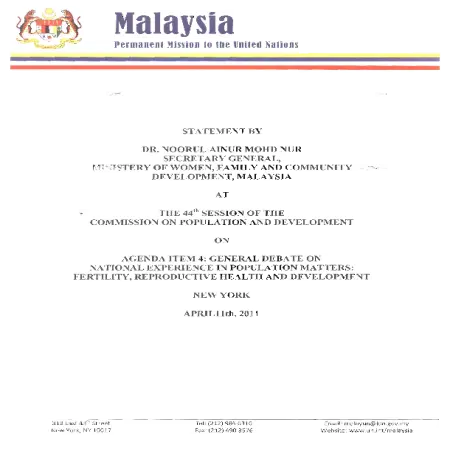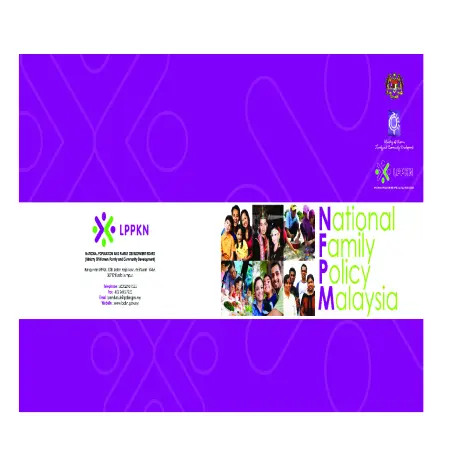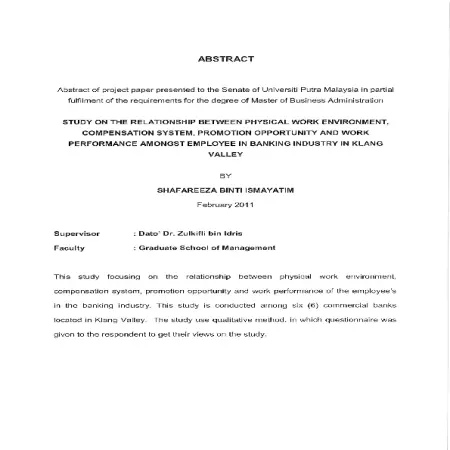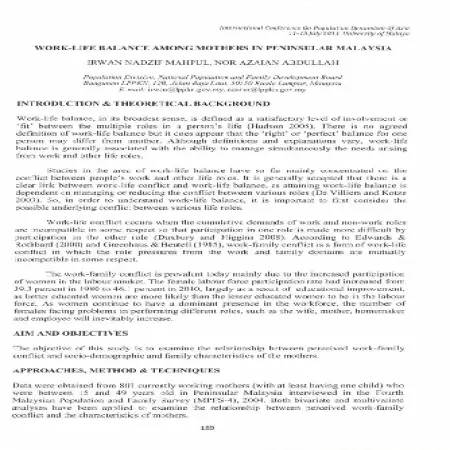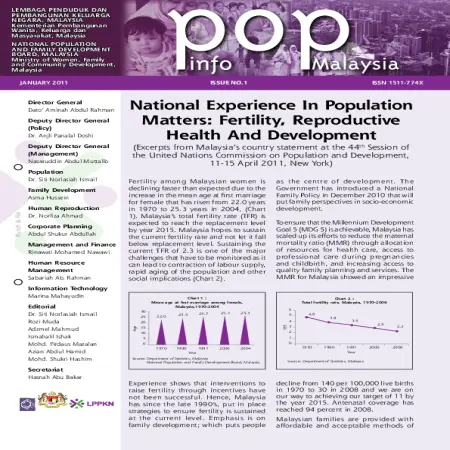Browse by Year
|
|
The prevalence of work-family conflict among mothers in Peninsular Malaysia
Item Type: Article
Editor:
Year: 00/11/2011
Abstract: Achieving work-family balance is dependent on managing the conflict between work and family roles. This study focuses on the prevalence of work-family conflict among mothers in Peninsular Malaysia. The objective of this study is to examine the relationship between perceived work-family conflict and socio-demographic and family characteristics of the mothers. Data were obtained from 801 currently working mothers (with at least having one child) who were between 15 and 49 years old in Peninsular Malaysia interviewed in the Fourth Malaysian Population and Family Survey (MPFS-4), 2004. The result of this study showed that ethnicity, age and employment are the main factors contributing to the prevalence of work-family conflict. However, there is no significant relationship between the prevalence of conflict and the studied family characteristics, namely, number of children, childcare arrangement and presence of children aged 7 to 24 years.
|
|
|
|
|
|
Indonesian labour migration to Sabah: causes and implications
Item Type: Conference or Workshop Item
Editor:
Year: 01/07/2011
Abstract: There is increasing interest among policymakers and researchers in the relationship between migration and development in low and middle income countries (United Nations, 2006). However, there remains a lack of empirical evidence on the impact of migration on economies of origin and destination, especially in Asia and Africa. This paper reports on one of the most substantial global migration corridors (World Bank, 2011) – that linking Indonesia and Malaysia. In 2009 it is estimated that migrants in Malaysia numbered 2 million, around a half of whom were Indonesians. It is based predominantly on a substantial survey of Indonesian labour migrants working in the East Malaysian state of Sabah undertaken in 2010. The paper begins with a brief discussion of contemporary thinking on the relationship between migration and development as a basis for examining the situation in Sabah. Some key features of the movement between Indonesia and Malaysia, especially that directed to Sabah, are then discussed. The economic contribution of Indonesian migrant workers is first examined in Sabah and then in the home areas of the Indonesian migrant workers. The paper then discusses the policy implications of these findings, especially in the Malaysian context.
|
|
|
|
|
|
The 44th session of the Commission on Population and Development on agenda item 4: general debate on national experience in population matters: fertility, reproductive health and development, 11th April, 2011
Item Type: Country Statement
Editor:
Year: 11/04/2011
Abstract: Fertility among Malaysian women is declining faster than expected due to the increase in the average age at first marriage for women that has risen from 24.7 years in 1991 to 25.3 in 2004. Malaysia's total fertility rate (TFR) is expected to reach the replacement level by year 2015. With more and more women participating in the labour force and prioritising career development, this has also led to many highly educated women choosing to marry late or not to marry at all.
Malaysia hopes to sustain the current fertility rate and not let it fall below replacement level. Sustaining the current TFR of 2.3 is one of the major challenges that has to be monitored as it can lead to contraction of labour supply, rapid aging of the population and other social implications.
|
|
|
|
|
|
National Family Policy
Item Type: Act & Policy
Editor:
Year: 00/03/2011
Abstract: Malaysia is one of the few countries that has an explicit policy on family. The National Family Policy (NFP) was launched on 19 March 2011. It advocates the concept of family wellbeing based on family values such as caring, honesty, justice and equity regardless of status, gender and age. At the macro level, the policy will be the catalyst to urge all stakeholders to take into account the family perspective in all their planning, strategy formulation or development efforts, either through their commitment, formulation or review of policies and laws that are not family friendly to ensure that programmes, services and family friendly facilities are accessible.
|
|
|
|
|
|
Study on the relationship between physical work environment, compensation system, promotion opportunity and work performance amongst employee in banking industry in Klang Valley
Item Type: Thesis
Editor:
Year: 01/02/2011
Abstract: This study focusing on the relationship between physical work environment, compensation system, promotion opportunity and work performance of the employee's in the banking industry. This study is conducted among six (6) commercial banks located in Klang Valley. The study use qualitative method, in which questionnaire was given to the respondent to get their views on the study. As for this study, the six selected banks and employees were chosen using the simple random sampling method. A total of 150 questionnaires were distributed to the employees and 120 questionnaires were returned and usable for further analysis. This study used Statistical Package for Social Science (SPSS) version 18.0 to analyze the data. The study found that physical working environment, compensation system and promotion opportunity have a positive relationship with the employee's work performance. All of the elements had only a low level significance relationship with work performance. However, from the three elements, promotion opportunity was the highest significance level of relationship, followed by the physical work environment and lastly the compensation system. This means that employee's work performance thus not much affected by the physical work environment, compensation system and promotion opportunity that organization have provided or introduced.
|
|
|
|
|
|
Work-life balance among mothers in Peninsular Malaysia
Item Type: Book Section
Editor:
Year: 01/01/2011
Abstract: Achieving work-family balance is dependent on managing the conflict between work and family roles. This study focuses on the prevalence of work-family conflict among mothers in Peninsular Malaysia. The objective of this study is to examine the relationship between perceived work-family conflict and socio-demographic and family characteristics of the mothers.
|
|
|
|
|
|
Cytotoxicity and expression profiles of apoptosis gene related in human cervical cancer (HeLa) cell lines in response to Newcastle disease virus (NDV) strains AF2240 And V4-UPM
Item Type: Thesis
Editor:
Year: 01/01/2011
Abstract: In this study the cytotoxicity and expression profiles of apoptosis gene related in human cervical cancer (HeLa) cell lines in response to Newcastle disease virus (NDV) strains AF2240 and V4-UPM were studied. NDV is a strain of avian paramyxovirus. NDV has been classified into the order Mononegavirales, family Paramyxoviridae, subfamily Paramyxovirinae and genus Rubulavirus. NDV caused severe economic losses in the poultry industry worldwide. Several local strains of Newcastle disease virus were reported to induce cytolysis to the cancerous cell lines. Strain AF2240 is a heat resistant viscerotropic velogenic NDV and strain V4-UPM is a heat resistant lentogenic which has significant higher thermostabilities of infectivity and haemagglutination were reported cytolysis leukemic cells in vitro and has shown in vivo anti leukemic agents . In this study the cytotoxicity effects of strains of NDV AF2240 and V4-UPM towards HeLa cell were determined by using standard microtetrazolium assay (MTT). Cytotoxicity dose 50% (CD50) cells treated with different titre of NDV as haemagglutination units (HAU) as compared to the untreated cells was estimated at 72 hours post-infection. The CD50 values obtained were 0.95 HAU and 1.0 HAU for strains AF2240 and V4-UPM, respectively. No cytolytic effect was noted towards normal cells (3T3) was observed. Both strains were also observed to inhibit HeLa cell proliferation. Morphological observations also have been done under inverted light and fluorescence microscopes. Under the inverted light microscope, the HeLa cells treated with both strains showed apoptotic features such as cell shrinkage, cell blebbing and formation of apoptotic bodies. Morphological features of apoptosis were also observed by using the AO/PI staining method under the fluorescence microscope. The AO/PI staining demonstrated the occurrence of apoptosis which was characterised mainly by chromatin condensation, nuclear shrinkage and formation of apoptotic bodies. Evidently, both strains AF2240 and V4-UPM used in the study were found to induce cells towards apoptosis rather than necrosis. NDV strain AF2240 and strain V4-UPM was also caused genotoxic in HeLa cells after two hours treatment with CD10 and CD25 values by alkaline comet assay. Results showed that HeLa cells treated with NDV strains AF2240, V4-UPM and hydrogen peroxide gave different distribution of scores. The HeLa cells treated with hydrogen peroxide as a positive control gave more percentage at score 2, 3 and 4 for both cytotoxicity values compared to the HeLa cells treated with NDV for both strains. Observation in this study has proved the genotoxic potential of the NDV strains AF2240 and V4-UPM to induce DNA damage on HeLa cells as early as two hours following treatment at very low cytotoxicity dose (CD10 and CD25) values. Meanwhile, the cell cycle analyses of HeLa cells treated with local strains of NDV AF2240 or V4-UPM did not induce cell cycle arrest in any specific phase. Sub-G1 phase (apoptosis peak) was found in both treated cells with a very high percentage compared to untreated cells with a small percentage. The results indicate that, the percentages of apoptosis were significantly increased (p≤0.05) in the time-dependent manner in both NDV strains treated HeLa cells. The molecular mechanisms of apoptosis may depend on the NDV strain and cell type. Six apoptosis genes were selected in this study namely Casp8, TNF-α, Bcl2 and TRAIL which focused on extrinsic pathway of apoptosis, while the gene Bax was used as an indicator for intrinsic pathway triggered by cellular stress. Lastly Myc, oncogene was used as an indicator for cell growth. From this study, NDV strain AF2240 was identified as a highly induced death receptor pathway due to the upregulation of TNF gene and the downregulation of Bax gene. Whereas NDV strain V4-UPM triggered both pathways but through the extrinsic pathway due to the very high expression of the TNF gene. The TNF gene was highly expressed due to its location and function as a stimulator of the death receptor pathway. The Casp8 gene was activated and expressed in order to enter the execution-phase of cell death. The Bcl-2 gene was continuously observed because of its function as an apoptosis regulator. Surprisingly, no expression was detected by the TRAIL gene. NDV strain AF2240 was more effective than NDV strain V4-UPM as an apoptosis inducer. These gene expression results showed that the apoptosis occurred and lead to cell death.
|
|
|
|
|
|
National experience in population matters : fertility, reproductive health and development
Item Type: Newsletter
Editor:
Year: 00/01/2011
Abstract: Fertility among Malaysian women is declining faster than expected due to the increase in the mean age at first marriage for female that has risen from 22.0 years in 1970 to 25.3 years in 2004. Malaysia’s total fertility rate (TFR) is expected to reach the replacement level by year 2015. Malaysia hopes to sustain the current fertility rate and not let it fall below replacement level.
|
|
|
|
|
|
Customer retention: a case study of LPPKN clinics
Item Type: Thesis
Editor:
Year: 00/00/2011
Abstract: This is a descriptive study intended to identify the main factors which contribute to the customer retention among the “Clinical Clients” of National Population and Family Development Board or “Lembaga Penduduk dan Pembangunan Keluarga Negara”
(LPPKN). The study focused on three variables to check on the level of influence, affect and effect to the process of customer retention. Those variables are service branding, perceived value and service quality. The study was also covered the impact and
influence of the demographic element to the service branding, perceived value and service quality in the process of customer retention. Health service sector is getting very important and competitive. This is highly true among the health clinics which are providing reproductive health services. Understanding and fulfilling the customers’ need will contribute to retaining existing customers and reduce the customer switching intentions. Through this research, we were able get some insights of factors and the ranking of importance of these factors in the process of customer retention. For the purpose of this study I have chosen LPPKN Clinics (Semi-Government) in Klang Valley and Seremban. The finding shows there is a positive relationship between perceived value and service quality with customer retention. Nevertheless relationship between service branding and customer retention is not supported for the LPPKN clinical setting. Analysis on the demographic factor showed that, it has a significant influence in regard to service branding, perceived value, service quality and customer retention.
|
|
|
|







